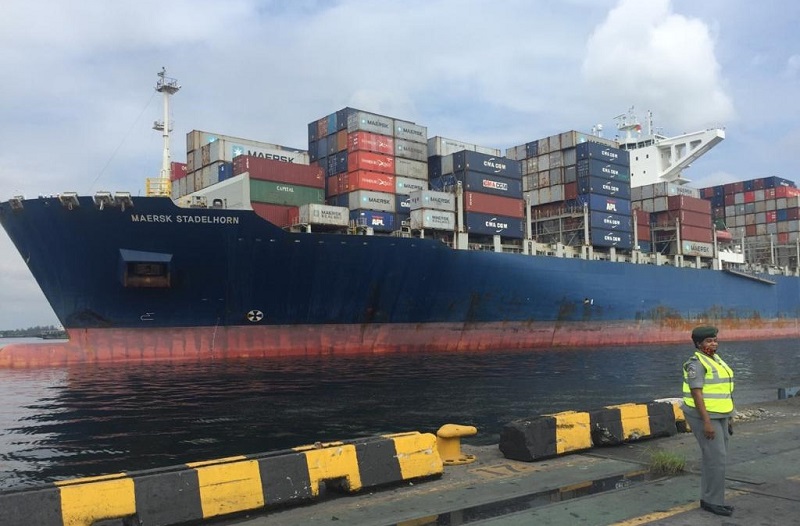BY CHUKS OLUIGBO
The Nigerian Shippers’ Council (NSC) says it has saved importers in the country from paying as much as N3.27 billion (or $6.54 million) as demurrage to oceangoing vessels between 2020 and 2021.
This feat was achieved through the activities of the Port Standing Task Team (PSTT) instituted to implement the provisions of the Nigerian Ports Process Manual, according to Emmanuel Jime, the executive secretary/CEO of NSC.
“The activities of the team saved the Nigerian economy an average vessel demurrage of $20,000 per day between year 2020 and 2021, which ultimately translates to the sum of $6,540,000 (N3,270,000,000.00k),” Jime said Tuesday at a breakfast meeting with maritime correspondents and business editors in Lagos.

Cargo owners have been paying billions of naira in demurrage to shipping companies as a result of delays in doing business in the nation’s ports, putting Nigerian ports among the most expensive. To tackle this, the Shippers’ Council set up the mandatory joint boarding and clearing of vessels by government agencies, which has helped to reduce the delays shipping liners experience in Nigerian ports as well as demurrages paid on Nigerian-bound cargoes.
The meeting with journalists was part of activities to mark Jime’s one year in office.
Speaking further on what his administration has been able to achieve in the past year, Jime said the average time for resolving complaints with regards to vessel infractions has considerably reduced from seven to 10 days to between one and four hours.
“More than 85 percent of vessels that called at Nigerian ports in 2021 left without any incident, which was not the case in time past. On the other hand, as regards compliance with Joint Cargo Examination by all government agencies involved in cargo clearance, the exercise has helped to increase the number of cargoes examined per day from 125 to an average of 230 boxes daily per terminal,” he said.
In all, he said the implementation of the Port Manual has facilitated the ease of doing business in Nigerian ports and drastically reduced corruption tendencies.
On complaints handling and resolution, Jime said the Council received and handled 518 complaints from cargo owners in 2021, and another 100 complaints in the first quarter of 2022.
“In 2021, the Council was able to recover over N1 billion in 2021 and another N18.5 million in the first quarter of 2022 were saved for stakeholders by the Council. The Council is currently working on compilation and analysis of complaints handled in the second quarter of the year 2022,” he said.
The Nigerian Shippers’ Council is also working in collaboration with a number of government departments and agencies, including the Nigerian Export Promotion Council (NEPC), Federal Competition and Consumer Protection Commission (FCCPC), Nigeria Customs Service (NCS), among others all geared towards trade facilitation. The collaboration with NEPC, for instance, has seen the approval of a total of 12 Domestic Export Warehouses nationwide for commencement of operations, including GEZEWA Commodity Exchange in Kano, MV EHILOMEL, Onne in Rivers State, ESSLIBRA in Ikorodu-Lagos State, Harris Logistics in Lokoja-Kogi State, Sealink Limited in Ajaokuta-Kogi State, Kaduna Inland Dry Port in Kaduna State, AMES-Edo Inland Dry Port in Benin-Edo State, among others.
Meanwhile, the Shippers’ Council will hold the 16th edition of the International Maritime Seminar from Tuesday, 5 to Thursday, 7 July, 2022 at the Abuja Sheraton Hotel and Towers.
The seminar, according to the NSC boss, is aimed at creating a platform through which justices/judges of various courts, both in Nigeria and West African sub-region, are enriched with the requisite jurisprudence to enable them face the challenges of interpretation and application of both domestic and international maritime law principles in the settlement of shipping and maritime related disputes/claims, as well as bringing together stakeholders, ship owners, terminal operators, government agencies, marine underwriters/surveyors, the academia, international maritime organisations, transport and logistics experts to discuss issues concerning the sector and proffer solutions where necessary.
He said the seminar will focus on addressing application of torts and bailment in Bill of Lading contracts; current issues in port operations (Standard Operating Procedure in ports and arising legal issues, Nigerian Customs E-Vin Valuation Method); current issues in maritime adjudication and practice (the challenges of simple contracts in the adjudication of maritime claims in Nigeria; ‘Sui Generis’ in Admiralty and the jurisdiction over crew wages in Nigeria; and cargo clearance & the limits of admiralty jurisdiction); security of the maritime domain (piracy and armed robbery at sea): Suppression of Piracy and other Maritime Offences (SPOMO) Act; case management in the resolution of maritime disputes: alternative dispute resolution, arbitration and the use of technology; and stress management.








